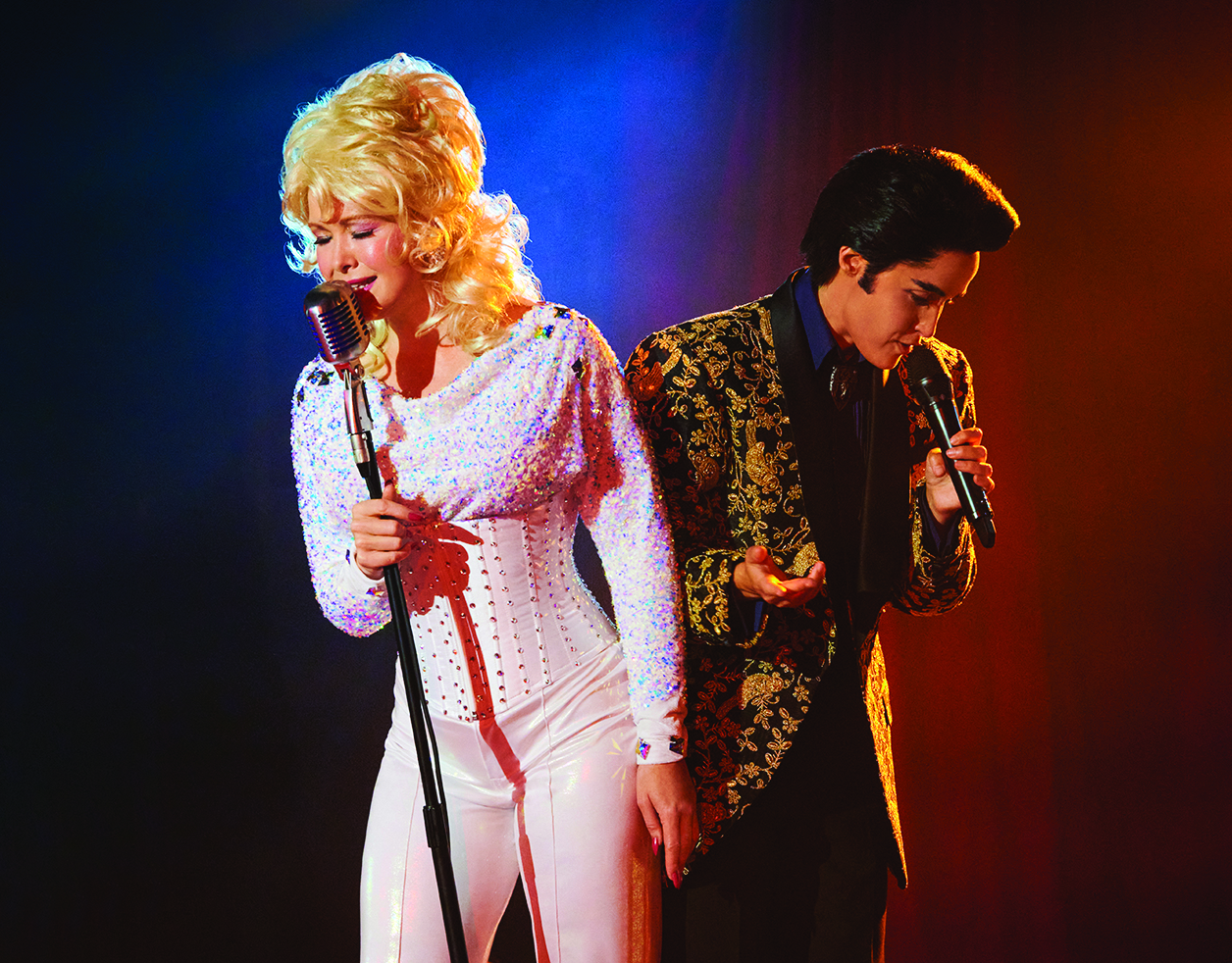Dolly Parton’s song ‘9 to 5’ – the theme to Colin Higgins’ 1980 screwball comedy of the same name – ruefully describes a go-getting worker whose caffeinated ‘cup of ambition’ tastes bitter indeed. Her job doesn’t value her ‘mind’ or reward her ‘service and devotion’; it only ever exploits them: ‘They let you dream just to watch ’em shatter / you’re just a step on the boss man’s ladder.’
In Gracie Otto’s 2022 comedy Seriously Red, vivacious real-estate valuer and Parton fan Raylene ‘Red’ Delaney (Krew Boylan) catches the eye of talent scout ‘Teeth’ (Celeste Barber) with her raucous karaoke performance of ‘9 to 5’ at a company awards night. The latter invites her to join The Great Pretender, a celebrity-impersonation agency run by Wilson (Bobby Cannavale), a former Neil Diamond tribute artist.
Raylene hasn’t previously seen herself as a Parton impressionist; rather, she is a superfan who woefully misinterpreted the awards night’s instruction to ‘dress up’. But having learned that she drunkenly groped her boss that evening, Raylene impulsively quits before he can fire her, seizing her new career opportunity with Parton’s folksy humour and grit – not to mention her platinum-blonde wigs, spangled stage costumes and pneumatic bosom. Paired with a disconcertingly method-acting Kenny Rogers impersonator (Daniel Webber), Raylene pursues personal and professional growth in the guise of her hero.
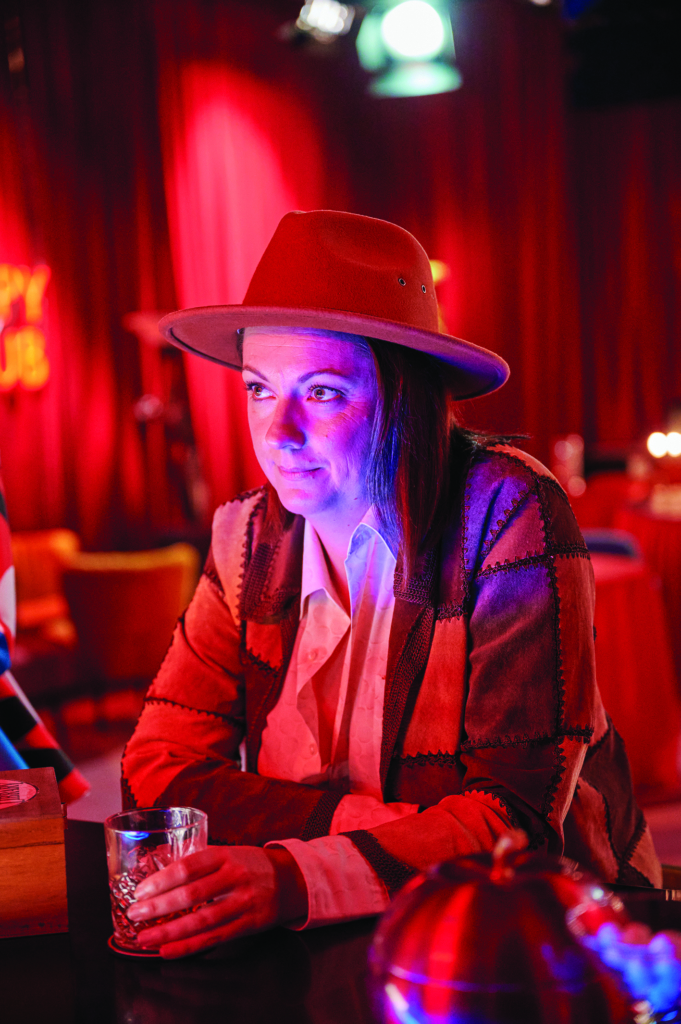
Seriously Red is frequently amusing, but ultimately facile and frustrating. Raylene takes to heart the inspirational Parton aphorism used as an intertitle: ‘Find out who you are and do it on purpose.’[1]Dolly Parton, Twitter post dated 9 April 2015, <https://twitter.com/dollyparton/status/585890099583397888>, accessed 7 November 2022. But the film itself – scripted by Boylan – doesn’t articulate what counts as work and as play, as authentic purpose and as mutable performance. Instead, it blurs these categories as Raylene determinedly sets out to build herself a new career by remaking herself in Parton’s image.
Raylene takes to heart the inspirational Parton aphorism used as an intertitle: ‘Find out who you are and do it on purpose.’ But the film itself doesn’t articulate what counts as work and as play, as authentic purpose and as mutable performance.
Something in Raylene sincerely responds to Parton’s celebrity persona; so what personal pleasures does she risk by turning her fandom into a job? As in ‘9 to 5’, should we surrender our ‘true selves’ to perform the role of ‘good workers’? And should someone’s ability to express an authentic self even be tied to their occupation?
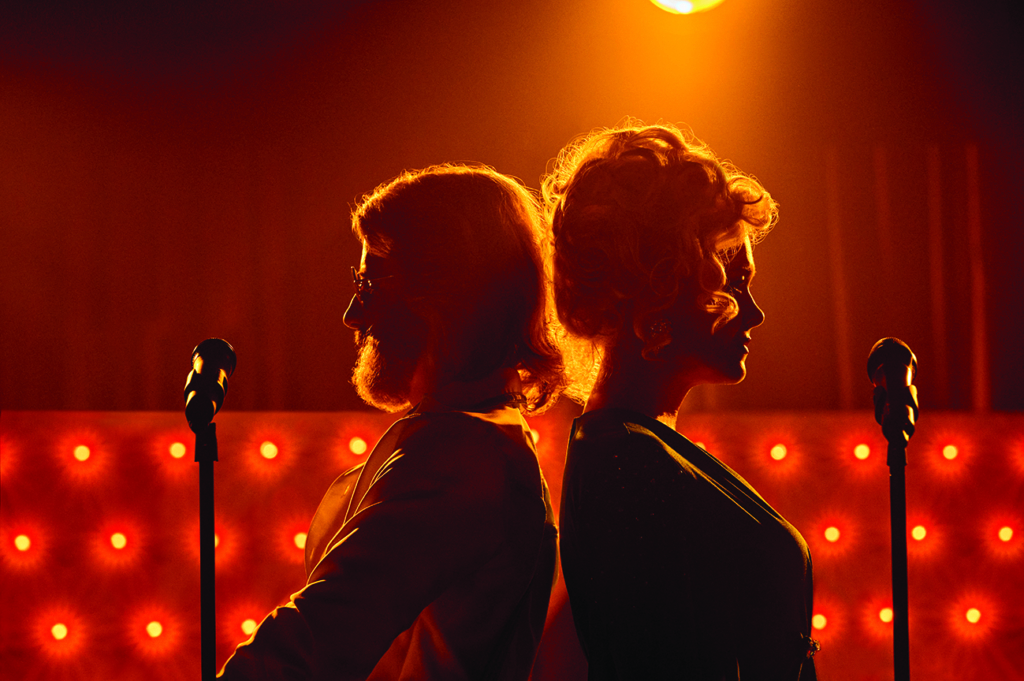
Playful or professional?
At the heart of the cheerfully entrepreneurial cliché ‘choose a job you love, and you’ll never have to work a day in your life’[2]See ‘Choose a Job You Love, and You Will Never Have to Work a Day in Your Life’, Quote Investigator, 2 September 2014, <https://quoteinvestigator.com/2014/09/02/job-love/>, accessed 7 November 2022. is a contrast between obligation and desire: ‘work’ is tedious or exhausting, while ‘love’ is easy and fun. ‘Working’ means obeying someone else, while ‘loving’ makes space for one’s own preferences.
We meet Raylene in what at first seems like her own home, because its retro decor matches her 1970s-style clothing and the familiar way she moves through it. She lies contemplatively in the empty bathtub, and dances down the hallway. But as she sits in the living room with a cup of tea, we realise the old man she’s talking to is the actual home owner; she’s just visiting to appraise his property for her employer.
Dressing for the awards night in the private haven of her backyard granny flat, which is stuffed with colourful textiles, knick-knacks and Parton memorabilia, Raylene is like a cocooning caterpillar. This metamorphic sequence is directed and edited like a makeover montage, priming the viewer for a triumphant reveal … but, instead, Raylene looks ridiculous in her orange polyester jumpsuit among her co-workers dressed in tasteful, neutral-toned suits and dresses.
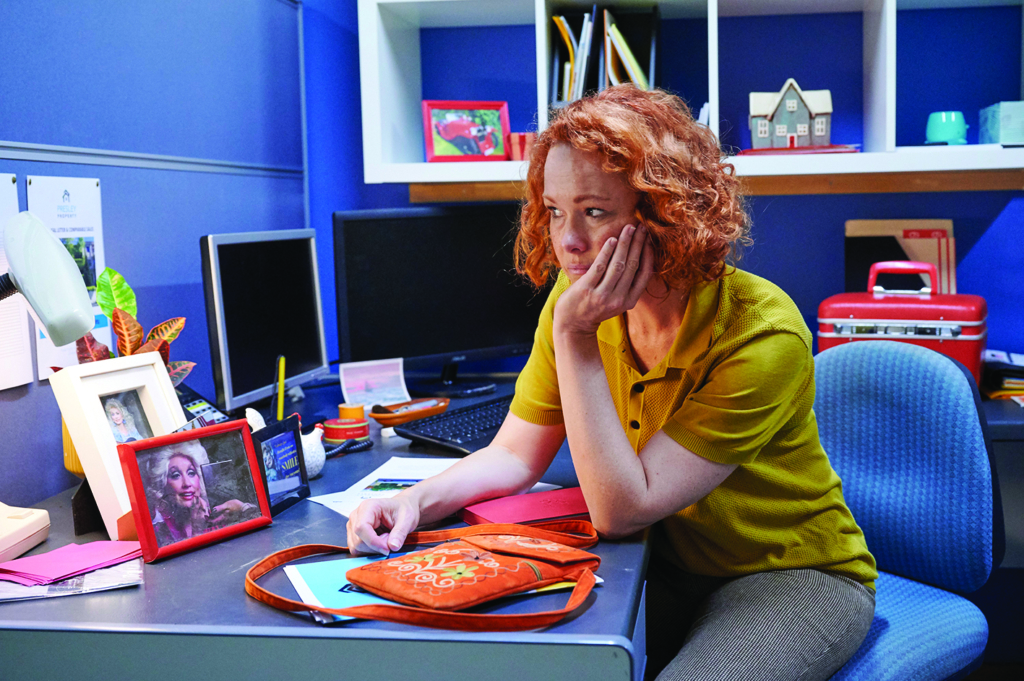
Raylene has never really been career-minded; property valuation is just the latest job she’s tried. For this reason, her mother, Viv (Jean Kittson), constantly belittles her for wasting her life; if hustling for money and status is what makes someone worthy of respect, then to Viv it must follow that the joy Raylene gets from pop culture condemns her as silly and immature.
As such, Seriously Red begins as a fan fairytale reminiscent of Rock Star (Stephen Herek, 2001), in which a humble tribute-band singer, played by Mark Wahlberg, is invited to join the real band. It’s enjoyable to watch someone who has been treated as hopeless and unserious for her Parton fandom find a community where that same devotion earns respect and opens up possibilities.
As the film opens, Raylene seems to admire Parton’s kindness and her resilience in the face of those who mock and underestimate her. But as she invests more and more in her impersonation – physically, emotionally and financially – Raylene seems to stop asking, ‘What would Dolly do?’ She becomes unpleasant, even cruel, to those around her. In this regard, both Boylan’s script and Otto’s direction owe an obvious debt to Muriel’s Wedding (PJ Hogan, 1994), in which camp performances of musical fandom express similar transformative fantasies for its downtrodden protagonist.
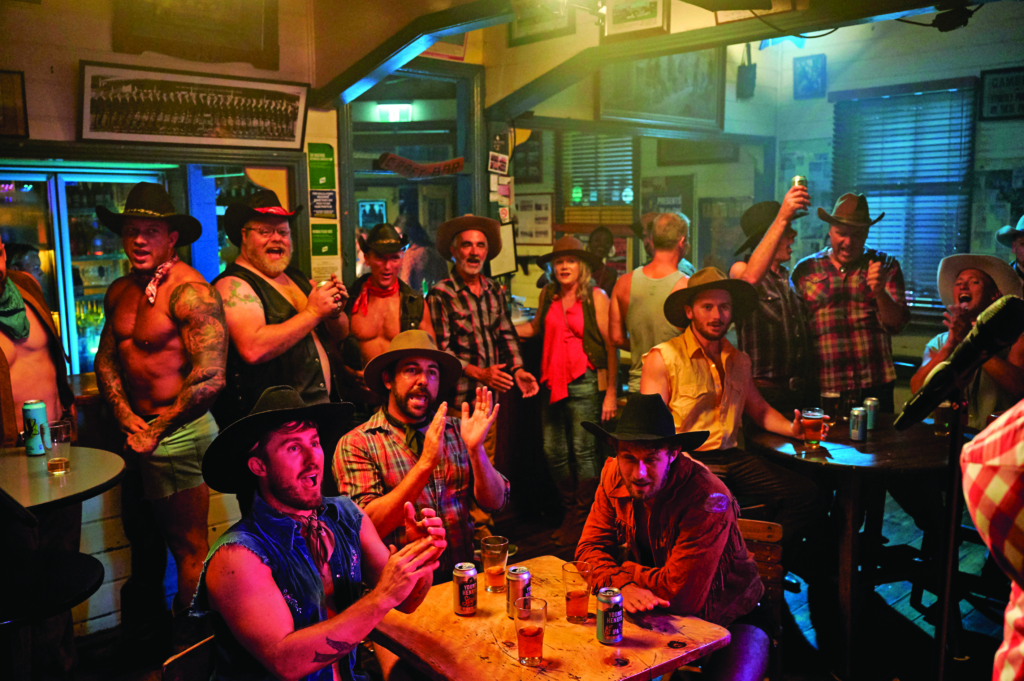
While Hogan’s film revolves around Muriel’s (Toni Collette) craving for romantic love, it’s professional respect that drives Raylene: she hopes to win her mother’s approval by succeeding in her new career; and while her best friend, fellow property valuer Francis (Thomas Campbell), is clearly in love with her, she doesn’t recognise his loyalty, taking it for granted that he’ll always help her. When Francis finally tells Raylene she’s all taking and no giving, she spurns him angrily and instead becomes a ‘work wife’ to ‘Kenny’. Their onstage collaboration leads to an offstage affair, and even when Raylene moves in with ‘Kenny’, they never drop character.
The film shines when Raylene is enjoying herself on stage, paying homage to her hero. She’s on familiar ground here: she already knows how Parton dresses, moves, speaks and sings; now, she draws power and pleasure from performing her fan knowledge. The film’s musical numbers are quite joyful – not just because Parton’s songs are, but also because Raylene’s own fandom is so infectious.
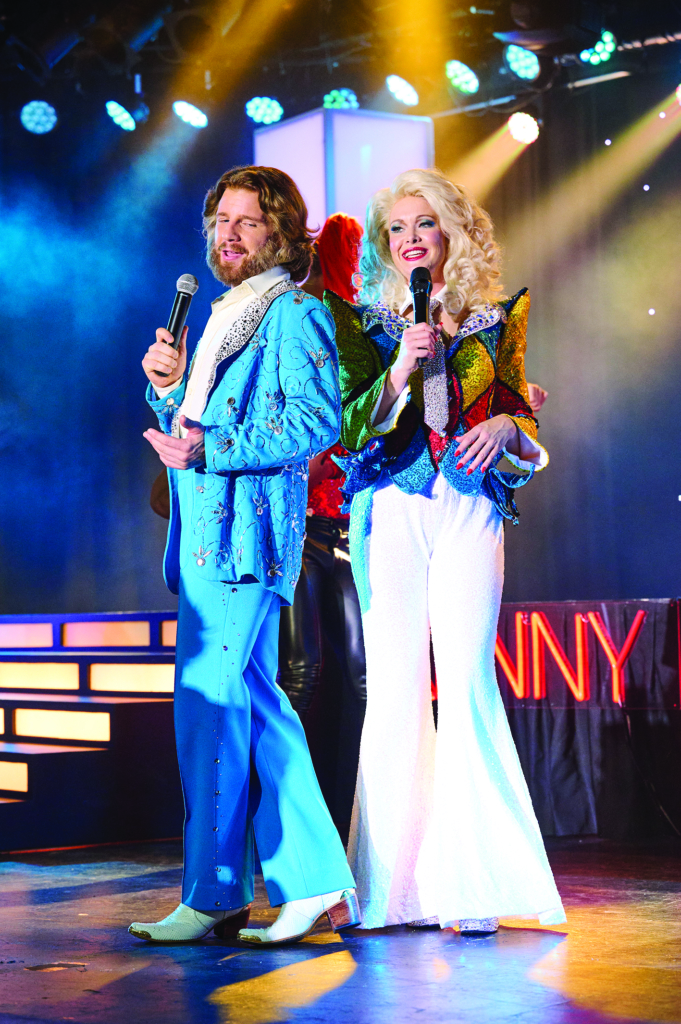
However, it’s unclear whether she’s actually meant to be any good. Boylan does capture Parton’s folksy patter; while, as Raylene’s singing voice, Loretta Miller of Melbourne band Jazzparty supplies a passable Parton imitation.[3]See Tim Chuma, ‘MIFF 2022: Seriously Red (2022) Review’, Impulse Gamer, 6 August 2022, <https://www.impulsegamer.com/miff-2022-seriously-red-2022-review/>, accessed 7 November 2022. But Raylene’s performances always have a certain uneven quality that reminds us she’s an amateur, whether she’s improvising in-character comebacks to snarky gay hecklers in Tamworth or freaking out in Hong Kong when she accidentally sets her wig ablaze.
This is the biggest problem with Seriously Red: it raises ideas without resolving them. It cheers Raylene on as she finally finds professional and personal acceptance among Wilson’s quirky ‘found family’ of celebrity impersonators. But it also wants us to pity her for trying – and failing – to parlay her fandom into a career. As a result, the film is maddeningly ambivalent about whether paid work can, or should, offer self-actualisation.
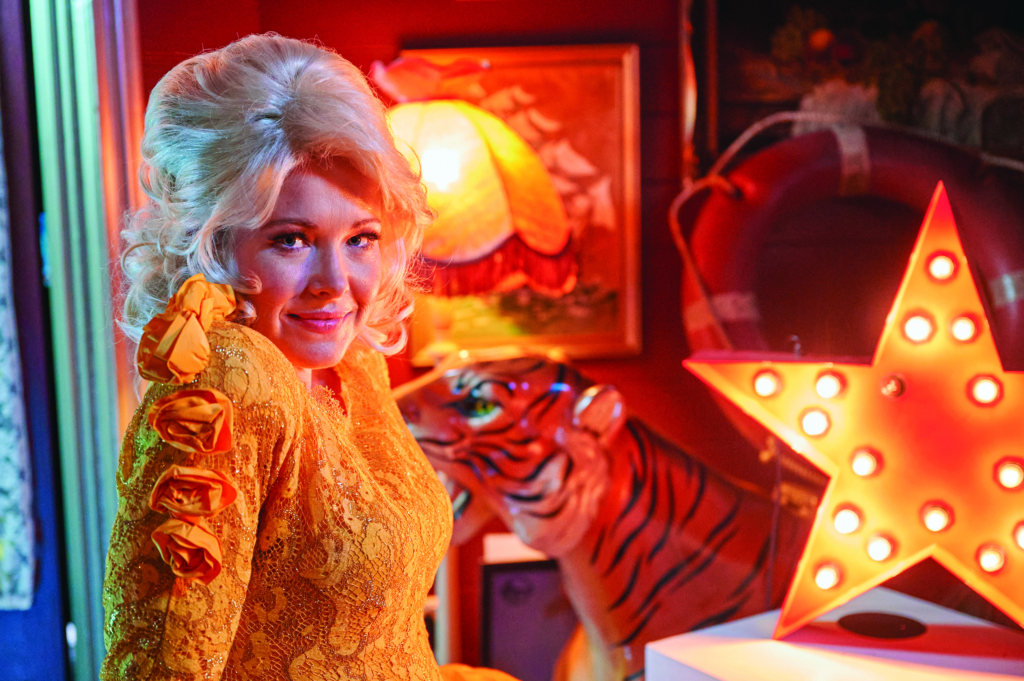
Real or fake?
Additionally, Seriously Red cannot reconcile its conflicting ideas of ‘authenticity’. First it wants Raylene to ‘be herself’ by impersonating someone else – someone who has always spotlighted the artifice of her public self-presentation.[4]See, for example, Nicole Carroll, ‘Dolly Parton: “The Whole Magic About Me Is That I Look Artificial, but I’m Totally Real”’, USA Today, updated 20 January 2021, <https://www.usatoday.com/in-depth/life/women-of-the-century/2020/08/27/dolly-parton-growing-up-tennessee-faith-family-fans/3387750001/>, accessed 7 November 2022. But then the film suggests that to perform this job too well is to sacrifice her true self. To make this leap, the film skims over the much more interesting complexities of celebrity-impersonation subculture in general, and Parton’s star persona in particular.
Cultural critic Susan Sontag’s influential 1964 essay ‘Notes on “Camp”’ argues that ‘the essence of Camp is its love of the unnatural: of artifice and exaggeration’.[5]Susan Sontag, ‘Notes on “Camp”’, in Fabio Cleto (ed.), Camp: Queer Aesthetics and the Performing Subject: A Reader, Edinburgh University Press, Edinburgh, 1999, p. 53. She defines it further as ‘the love of the exaggerated, the “off”, of things-being-what-they-are-not’.[6]ibid., p. 56. Tribute shows adhere closely to this concept: the audience enjoys the presence of celebrity while understanding they are not watching the ‘real’ celebrity.
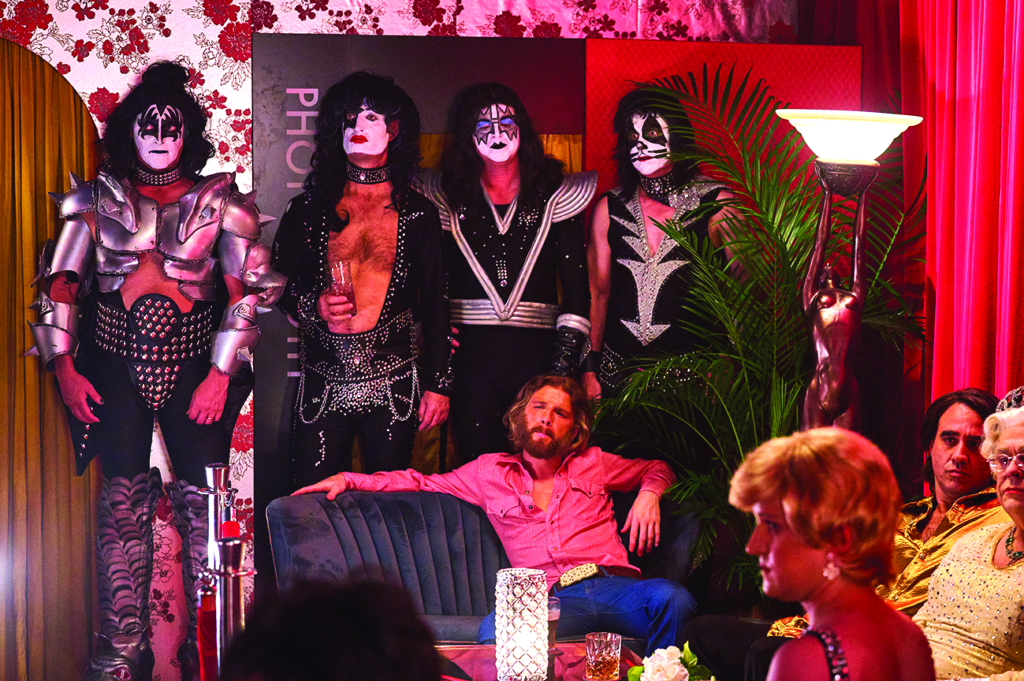
Echoing Sontag’s observation of ‘the peculiar relation between Camp taste and homosexuality’,[7]ibid., p. 64. cinema scholar Richard Dyer uses a similar framework to discuss what he describes as a ‘gay sensibility’. In Dyer’s view, this mode of performance and spectatorship ‘holds together qualities that are elsewhere felt as antithetical: theatricality and authenticity [… as well as] intensity and irony, a fierce assertion of extreme feeling with a deprecating sense of its absurdity’.[8]Richard Dyer, Heavenly Bodies: Film Stars and Society, St. Martin’s Press, New York, 1986, p. 154. Perhaps Seriously Red is simply too timid: because it won’t go absolutely tits-out bonkers, it can’t also go deep enough to reconcile its own contradictions as camp.
As such, Seriously Red feels like a weak throwback to 1990s Australian character comedies such as Strictly Ballroom (Baz Luhrmann, 1992),[9]Incidentally, a film that featured Otto’s father, Barry, in a major role. The Adventures of Priscilla, Queen of the Desert (Stephan Elliott, 1994) and the aforementioned Muriel’s Wedding. All are far more aggressively camp than Otto’s film, adopting a heightened, even grotesque, tone and queer sensibility to locate sincerity and pathos in unexpected places.[10]See John Champagne, ‘Dancing Queen? Feminist and Gay Male Spectatorship in Three Recent Films from Australia’, Film Criticism, vol. 21, no. 3, Spring 1997, pp. 66–88.
Raylene is clearly a ‘Muriel’ figure: an awkward misfit who tries on different people-pleasing identities before locating a tasteful self somewhere between the ‘too real’ ugly duckling we first meet and her ‘too fake’ Parton persona. Even her glow-up over the course of the film resembles Muriel’s: Raylene goes from a manic, frizzy-haired frump to a sleekly groomed motivational speaker, with only a tastefully sparkly dress to hint at her rhinestone-studded past. Yet Seriously Red is missing the knowingness that would have marked its 1990s ‘Oz camp’ flourishes as homage; it just feels unoriginal. And especially compared to its 1990s counterparts, it seems weirdly averse to queer subtexts – even though the film is set in a performative milieu that overlaps substantially with the queer subculture of drag.
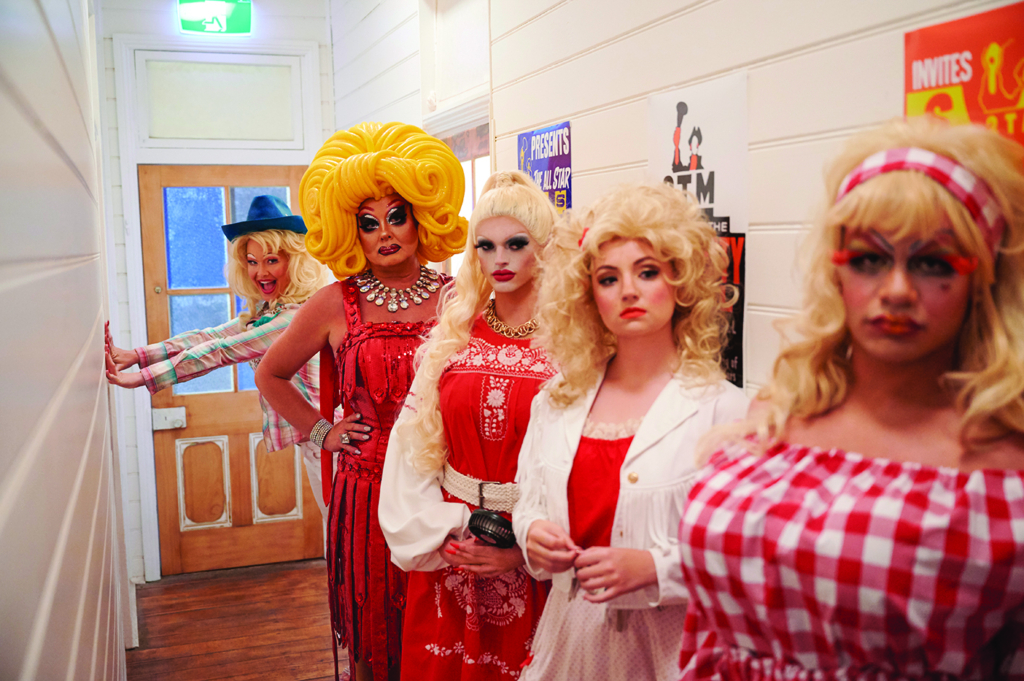
Seriously Red’s campest scenes take place in the Copy Club: a kind of speakeasy where tribute performers hang out in character – many in drag – to appraise one another’s work. These sequences are filled with delightful, witty cameos that cry out for pause and rewind buttons. They’re a tough crowd, but naturally Raylene wins them over – by pitilessly roasting the club’s previous star, surly drag-king Elvis Presley impersonator ‘EP’ (played by a nearly unrecognisable Rose Byrne).
‘EP’ is the film’s most tantalisingly underwritten character. Introduced as the hired musical performer at the real-estate agency party, he ends up in bed with Raylene on that infamous night, but later simmers with rage watching her career take off. A late flashback to their encounter in Raylene’s granny flat only further muddies what could have been an intriguing exploration of gender performativity, identity and sexuality.
While many drag performers cross-dress, Parton’s celebrity persona is a cheerful burlesque of feminine sexuality: platinum-blonde wigs, heavy make-up, fake fingernails, fake eyelashes and fake boobs. ‘If I hadn’t been a woman, I’d have been a drag queen,’ Parton has quipped.[11]Dolly Parton, quoted in Johann Hari, ‘“It Costs Me a Lot of Money to Look This Cheap”’, Evening Standard, 5 April 2012, <https://www.standard.co.uk/showbiz/it-costs-me-a-lot-of-money-to-look-this-cheap-6696737.html>, accessed 27 October 2022. Far from hiding her history of cosmetic surgery, Parton jokes about it: ‘I am a self-made woman, and I have the doctor bills to prove it!’[12]Dolly Parton, quoted in Chris Haney, ‘Dolly Parton Hilariously Explains How She’s a “Self-made Woman”’, Outsider, 31 October 2020, <https://outsider.com/entertainment/music/dolly-parton-hilariously-explains-how-shes-a-self-made-woman/>, accessed 27 October 2022. Raylene, too, begins to remake her body in pursuit of her career: eschewing her DIY Dolly bosom of three bras stuffed with socks, she undergoes breast-augmentation surgery (which, in a jarring tonal shift, Otto stages as a Busby Berkeley–like anaesthetic fantasia set to Parton’s 1972 song ‘Touch Your Woman’).
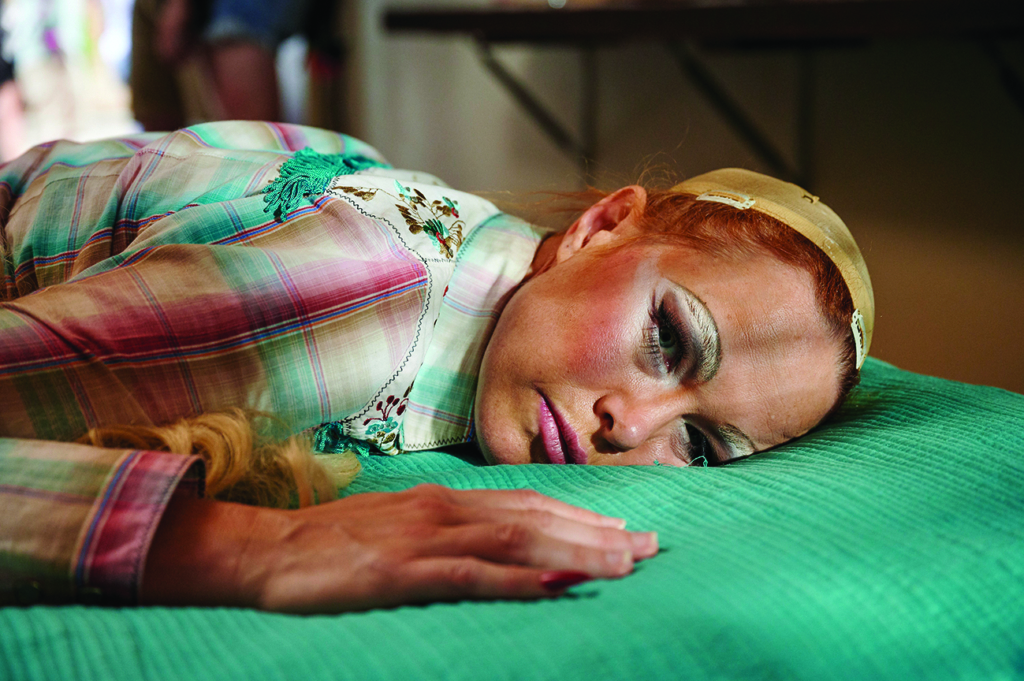
Having embarked upon her affair with ‘Kenny’ as a kind of erotic cosplay – and having sought the surgery at his suggestion – she becomes increasingly disquieted by his refusal to drop character. She can see this isn’t joyful fandom to him: ‘Kenny’ is a traumatised boy who uses his performance to evade vulnerability. And the harder she works, the more she’s losing the joy, too.
When she shares her workplace struggles with her boss, Wilson suggests that Raylene is simply too special to make it as an impersonator: ‘The more unique you are as a person, the harder it is to be someone else.’ The script is full of similar go-getting platitudes – and this one is especially cruel to ‘Kenny’, who is secretly suffering, but whom Wilson treats as a generic shell of a person. But Otto doesn’t treat these moments as camp pathos, just as she strips the winking self-awareness from Parton’s famous repertoire of ‘Dollyisms’, such as ‘It costs a lot to look this cheap.’[13]Parton, quoted in Hari, op. cit. Rather, there’s an unnerving earnestness to Seriously Red, even in its comedy.
What really tips Raylene over the edge is a family dinner where she once again fails to impress Viv, even with renovated bosom and ‘Kenny’ in tow. Meanwhile, Francis, who is by now completely estranged from Raylene, has brought his new girlfriend … whose hair is a similar shade of red to hers. The film undermines its message of uniqueness and authenticity because, having worked so hard to make it as Dolly, Raylene finally sees how easily someone else can fill her role in Francis’ life. It’s a tough lesson in workplace relations: everyone is replaceable.
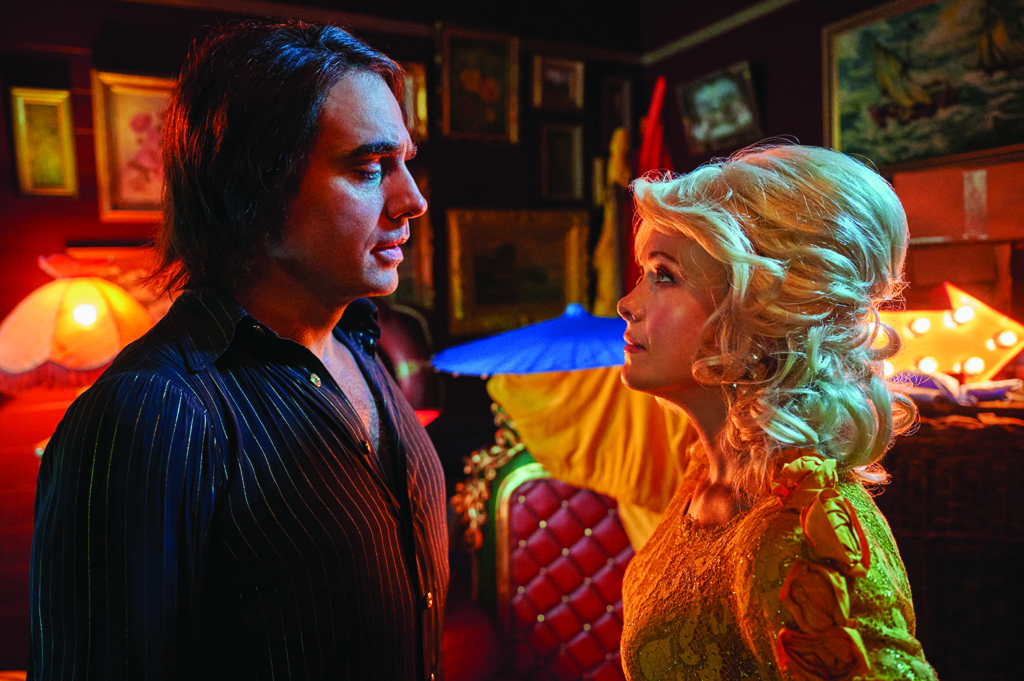
Seriously Red doesn’t provide satisfying answers to the serious questions it raises. In paradoxically championing the act of striving while playing as a cautionary tale about striving for the wrong goals, the film tries so very hard. But because it buys into Raylene’s enterprising ‘grindset’, it misses the opportunity to say something more subversive: that ‘work’ should stay the hell away from the people we love.
Endnotes
| 1 | Dolly Parton, Twitter post dated 9 April 2015, <https://twitter.com/dollyparton/status/585890099583397888>, accessed 7 November 2022. |
|---|---|
| 2 | See ‘Choose a Job You Love, and You Will Never Have to Work a Day in Your Life’, Quote Investigator, 2 September 2014, <https://quoteinvestigator.com/2014/09/02/job-love/>, accessed 7 November 2022. |
| 3 | See Tim Chuma, ‘MIFF 2022: Seriously Red (2022) Review’, Impulse Gamer, 6 August 2022, <https://www.impulsegamer.com/miff-2022-seriously-red-2022-review/>, accessed 7 November 2022. |
| 4 | See, for example, Nicole Carroll, ‘Dolly Parton: “The Whole Magic About Me Is That I Look Artificial, but I’m Totally Real”’, USA Today, updated 20 January 2021, <https://www.usatoday.com/in-depth/life/women-of-the-century/2020/08/27/dolly-parton-growing-up-tennessee-faith-family-fans/3387750001/>, accessed 7 November 2022. |
| 5 | Susan Sontag, ‘Notes on “Camp”’, in Fabio Cleto (ed.), Camp: Queer Aesthetics and the Performing Subject: A Reader, Edinburgh University Press, Edinburgh, 1999, p. 53. |
| 6 | ibid., p. 56. |
| 7 | ibid., p. 64. |
| 8 | Richard Dyer, Heavenly Bodies: Film Stars and Society, St. Martin’s Press, New York, 1986, p. 154. |
| 9 | Incidentally, a film that featured Otto’s father, Barry, in a major role. |
| 10 | See John Champagne, ‘Dancing Queen? Feminist and Gay Male Spectatorship in Three Recent Films from Australia’, Film Criticism, vol. 21, no. 3, Spring 1997, pp. 66–88. |
| 11 | Dolly Parton, quoted in Johann Hari, ‘“It Costs Me a Lot of Money to Look This Cheap”’, Evening Standard, 5 April 2012, <https://www.standard.co.uk/showbiz/it-costs-me-a-lot-of-money-to-look-this-cheap-6696737.html>, accessed 27 October 2022. |
| 12 | Dolly Parton, quoted in Chris Haney, ‘Dolly Parton Hilariously Explains How She’s a “Self-made Woman”’, Outsider, 31 October 2020, <https://outsider.com/entertainment/music/dolly-parton-hilariously-explains-how-shes-a-self-made-woman/>, accessed 27 October 2022. |
| 13 | Parton, quoted in Hari, op. cit. |
